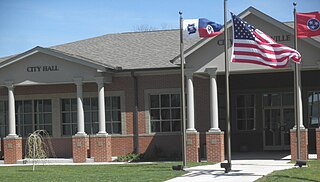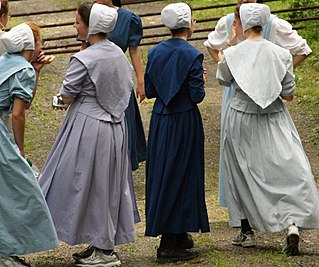Related Research Articles

Caneyville is a home rule-class city in Grayson County, Kentucky, in the United States. The population was 608 at the 2010 census. Named for its location on Caney Creek, Caneyville had a post office by 1837 and a town charter by 1840 and was incorporated by the state legislature in 1880.

Lobelville is a city in Perry County, Tennessee, United States that was established as a trading post on the Buffalo River in 1854. The population was 897 at the 2010 census.

The Old Order River Brethren, formerly sometimes known as York Brethren or Yorkers, are a River Brethren denomination of Anabaptist Christianity with roots in the Radical Pietist movement. As their name indicates, they are Old Order Anabaptists.
The New Order Amish are a subgroup of Amish that split away from the Old Order Amish in the 1960s for a variety of reasons, which included a desire for "clean" youth courting standards, meaning they do not condone the practice of bundling during courtship. Tobacco and alcohol are also not allowed. They also wished to incorporate more evangelical elements into the church, including Sunday school and mission work. Some scholars see the group best characterized as a subgroup of the Old Order Amish, despite the name.
Amish Mennonites came into existence through reform movements among North American Amish mainly between 1862 and 1878. These Amish moved away from the old Amish traditions and drew near to the Mennonites, becoming Mennonites of Amish origin. Over the decades, most Amish Mennonites groups removed the word "Amish" from the name of their congregations or merged with Mennonite groups.
The Beachy Amish Mennonites, also known as the Beachy Amish or Beachy Mennonites, are a Conservative Anabaptist tradition of Christianity.

The Amish, formally the Old Order Amish, are a group of traditionalist Anabaptist Christian church fellowships with Swiss and Alsatian origins. As they maintain a degree of separation from surrounding populations, and hold their faith in common, the Amish have been described by certain scholars as an ethnoreligious group, combining features of an ethnicity and a Christian denomination. The Amish are closely related to Old Order Mennonites and Conservative Mennonites, denominations that are also a part of Anabaptist Christianity. The Amish are known for simple living, plain dress, Christian pacifism, and slowness to adopt many conveniences of modern technology, with a view neither to interrupt family time, nor replace face-to-face conversations whenever possible, and a view to maintain self-sufficiency. The Amish value rural life, manual labor, humility and Gelassenheit.
G. C. Waldrep is an American poet and historian.
Over the years, as Amish churches have divided many times over doctrinal disputes, subgroups have developed. The "Old Order Amish", a conservative faction that withdrew in the 1860s from fellowship with the wider body of Amish, are those that have most emphasized traditional practices and beliefs. There are many different subgroups of Amish with most belonging, in ascending order of conservatism, to the Beachy Amish, New Order, Old Order, or Swartzentruber Amish groups.
The Noah Hoover Mennonites, called "Old Order Mennonite Church (Hoover)" by the Mennonite World Conference, and sometimes called "Scottsville Mennonites”, are a group of very plain Old Order Mennonites that originally came from the Stauffer Mennonites and later merged with several other groups. Today it is seen as an independent branch of Old Order Mennonites. The group differs from other Old Order Mennonites by having settlements outside the US and Canada and by attracting new members from other groups on a larger scale. They have more restrictions on modern technology than all other Old Order Mennonite groups. They are rather intentionalist minded than ultra traditional.
Elmo Stoll was a former Old Order Amish bishop, writer and founder of the "Christian Communities". He was one of the few Amish who "have risen to prominence over the years".
The "Christian Communities" were Christian intentional communities with an Anabaptist worldview, founded and led by Elmo Stoll, a former Old Order Amish bishop. They were founded in 1990 and disbanded some two years after Stoll's early death in 1998. At the time of Stoll's death there were five "Christian Communities", four in the U.S. and one in Canada. G.C. Waldrep calls them "perhaps the most important "para-Amish" group".
The Caneyville Christian Community was an Anabaptist community, located in Caneyville, Kentucky, living a plain conservative lifestyle, true to the vision of former Old Order Amish bishop Elmo Stoll. G. C. Waldrep classifies them as "para-Amish". Among Anabaptists the community is often simply called "Caneyville".
Believers in Christ is a Plain horse-and-buggy Anabaptist Christian community at Cane Creek, Lobelville, Tennessee, that is rather intentional than traditional. They are sometimes seen as either Amish or Old Order Mennonite. G. C. Waldrep classifies them as "para-Amish". Among Anabaptists the community is often simply called "Lobelville".
The Michigan Amish Fellowship is a subgroup or affiliation of Old Order Amish. In 2022 this network of churches consisted of 33 settlements in Michigan, Maine, Missouri, Kentucky, Montana, and Wyoming. Stephen E. Scott described the affiliation which emerged in 1970 in Michigan as "Amish Reformist".
A Seeker is a person likely to join an Old Order Anabaptist community, like the Amish, the Old Order Mennonites, the Hutterites, the Old Order Schwarzenau Brethren or the Old Order River Brethren. Among the 500,000 members of such communities in the United States there are only an estimated 1,200 to 1,300 outsiders who have joined them.

Old Order Anabaptism is a collection of communities that have preserved the old ways of Anabaptist Christian religion and lifestyle.
The Old Beachy Amish or Old Beachy Amish Mennonites, also called Midwest Beachy Amish Mennonites, are a Plain, car-driving Beachy Amish group, that preserves the old ways of the Beachy Amish including the German language. They live in Kentucky and Illinois. They are part of the Amish Mennonite movement in a broader sense, but they are not an organized denomination.
The New Order Amish Fellowship or New New Order Amish, most commonly called New Order Christian Fellowship, is the most progressive affiliation among the New Order Amish. Because some scholars see the New Order Amish just as a subgroup of the Old Order Amish, the New Order Christian Fellowship is thus the most progressive affiliation among the Old Order Amish. In spirituality, they are close to Beachy Amish. Their use of horse and buggy transportation and their preservation of the German language distinguishes them from the Beachys, except for the Old Beachy Amish who have also retained the German language but drive cars.
References
- ↑ G.C. Waldrep: The New Order Amish And Para-Amish Groups: Spiritual Renewal Within Tradition, in The Mennonite Quarterly Review 82 (2008), page 414.
- ↑ G.C. Waldrep: The New Order Amish And Para-Amish Groups: Spiritual Renewal Within Tradition, in The Mennonite Quarterly Review 82 (2008), page 415.
- ↑ Donnermeyer, Joseph, and Cory Anderson: "The Growth of Amish and Plain Anabaptists in Kentucky." in Journal of Amish and Plain Anabaptist Studies 2(2):215, page 232, 2014.
- ↑ Vernon Community at www.monroecountykytourism.com
- ↑ G.C. Waldrep: The New Order Amish And Para-Amish Groups: Spiritual Renewal Within Tradition, in The Mennonite Quarterly Review 82 (2008), page 415.
- ↑ Monroe County, Kentucky - County Membership Report (2020) at Association of Religion Data Archives.
